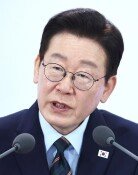Too Many Self-employed?
The number of the self-employed in Korea was 5,514,000 at the end of last year, the lowest level since the statistic was first compiled in 1999. The figure dropped 265,000 last year, much more than the number of daily workers (191,000). This is because they stopped or closed their businesses due to excessive competition and the economic downturn. Sixty percent of the self-employed in the service sector and retail also say they cannot make ends meet.
The Korea Chamber of Commerce and Industry says the ratio of the population to the number of restaurants, lodging facilities and retail stores was four to five times the U.S. level in 2008. The share of the self-employed among the employed is 33 percent, twice the average of the Organization for Economic Cooperation and Development (16 percent). Since there are relatively too many companies and workers in Korea, the domestic market is overly competitive and in a chronic depressed state. Competition in communications, delivery and the credit card industry is also intense. This is literally a red ocean of bloody competition.
People go into business for themselves in the low-added value and low-growth sector because of the lack of jobs at large companies and the difficulty of entering the high-value added service industry. The Korea Institute for International Economic Policy says the countrys market barrier index in the service sector (the higher the figure, the more difficult to enter the market) is 1.36, much higher than the U.S. (1.06), Canada (1.07) and Japan (1.11). The Korea Development Institute says overregulation in the Korean medical service industry has prevented the sector from catching up to the level of advanced economies.
OECD chief economist Chiara Criscuolo said in a discussion in Seoul last month, Koreas excessive regulation of the service sector and lower productivity have resulted in negative consequences to the development of other industries, such as manufacturing. If Koreas service industry, the least developed among OECD member countries, opens its market and increases investment to enhance competitiveness, more decent jobs will be created and more global champions can emerge in manufacturing.
The government could not hold a hearing on advancing the service industry last year due to a backlash from stakeholders. If President Lee Myung-bak, Strategy and Finance Minister Yoon Jeung-hyun, and Knowledge Economy Minister Choi Kyung-hwan want to gain momentum in job creation in the service sector as they promised, the National Assembly must pass a bill on greatly removing entry barriers in the first half of this years parliamentary session. Without allowing foreign medical institutions in free economic zones, the service industry cannot be modernized. By sharpening its competitive edge in export services, Korea can aggressively make inroads into other markets such as China and India.



![[단독]폴란드, 韓 해군 최초 잠수함 ‘장보고함’ 무상 양도 안받기로](https://dimg.donga.com/c/138/175/90/1/wps/NEWS/IMAGE/2026/02/27/133437397.1.jpg)

![‘노인 냄새’ 씻으면 없어질까?…“목욕보다 식단이 더 중요”[노화설계]](https://dimg.donga.com/c/138/175/90/1/wps/NEWS/IMAGE/2026/02/27/133434557.3.jpg)

